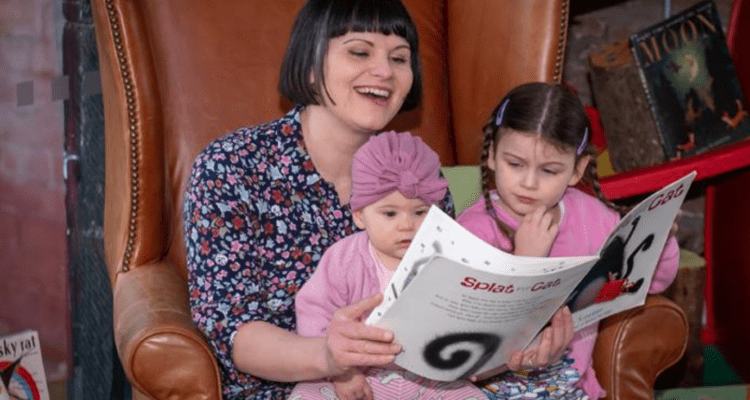Get Into Reading: Reducing Implicit Prejudice
 This week, we were pointed towards a rather insightful article about a piece of psychological research by one of our partners in Belgium, Dirk Terryn. Dirk has been part of our ongoing work in developing a shared reading partnership with the city of Antwerp and the wider region of Flanders, led by the city council’s education service, which has played a huge role in taking the work of The Reader Organisation to an international level.
This week, we were pointed towards a rather insightful article about a piece of psychological research by one of our partners in Belgium, Dirk Terryn. Dirk has been part of our ongoing work in developing a shared reading partnership with the city of Antwerp and the wider region of Flanders, led by the city council’s education service, which has played a huge role in taking the work of The Reader Organisation to an international level.
The research, which was carried out by the Association for Psychological Science (APS) and published in their journal Psychological Science, focused on the prevalence and tendency of implicit prejudice; particularly across different cultures and ethnicities. The article (which can be read here) describes how this sort of prejudice is often caused by a lack of knowledge or lack of understanding about a particular (or indeed, several) culture(s), and how the APS research showed that increased connection and exposure to members of a cultural group is likely to decrease our prejudice towards it.
More specifically though, the research showed that even a brief opportunity to take part in another's culture can vastly improve intergroup attitudes, even months down the line. Cues for participation or connection as small or insignificant as, for example, a shared birthday, have been shown to bring people together, eventually even leading them to share common goals and motivations.
In a way, this is what The Reader Organisation is trying to achieve through Get Into Reading, our shared reading scheme that takes place in a variety of settings throughout the country, every day and every week. The bringing together of people from various backgrounds and walks of life to sit within a small group of about 5 - 8 people is what, first of all, creates an opening; an opportunity for communication and social connection between those very people.
After that, the various perceptions and meanings that are often steadily teased out from the text which the group may be reading is the second step. This is essentially the creating and strengthening of shared meanings, often across social and cultural boundaries , which is what Get Into Reading is all about. Members of a group can and often do find that they have things in common, which inevitably leads to social relationships being forged outside of the group. And over longer periods of time, many begin to share personal feelings or anecdotes that are unwittingly brought to the surface by the nature of the various texts.
The researchers at APS do note, however, that the positive effects of the study are very much dependent on people feeling that they have "freely chosen to participate and engage in cultural activities". Making people feel obligated to take part can, therefore, reduce these benefits and even possibly have an adverse effect.
Group members are not encouraged to participate in Get Into Reading groups with the aim or motive to improve their understanding of another's culture. Reasons for attendance at a GIR group will obviously vary massively for many people, being highly dependable on the setting, nature and purpose of the group; not to mention the personal reasons of the readers themselves. But multicultural interaction does take place regularly across GIR groups, and is without a doubt one of the most valued benefits.
Just take this view from a London-based reader who moved to the UK from Madrid and decided to participate in a GIR group to familiarise herself with British culture and have more opportunity to practice her English. She said:
It's nice to arrive and be greeted with such kindness. The reading of fragments that are then discussed at a not-too-big a table with a cup of tea in hand creates an intimate atmosphere conducive to sharing impressions, feelings and experiences. Our coordinator, Val (also Penny and others), plays a key role as she keeps the cadence, encourages us to talk, touches points to develop and contributes, like the others, with her personal experiences that enrich the conversation. Val’s high intelligence, skills and sensitivity make it a particularly pleasant and interesting experience.
My group has been very generous to me and Val and the other members take the time to explain to me what I might miss because English is not my native language, because I did not grow up here, or for whatever reason. The time shared has favoured the development of personal relationships and more than once I have found myself sharing concerns as well as good and bad personal news.
We may perhaps say then that multicultural interaction is a secondary outcome, or 'byproduct' of Get Into Reading...it strives to improve connections amongst people within communities, which may or not include those from contrasting social and cultural backgrounds. This is the beauty of Get Into Reading - the fact that no two groups are ever the same in their composition, and the fact that new and unforeseen outcomes are making themselves known all the time.
Reducing implicit cultural prejudice may just be another of these many wonderful outcomes. While it is perhaps not always the aim, it is certainly always most welcome.
Share
Related Articles

Reader Revisited: Reading with Looked-After Children by Grace Frame
We're taking a trip down memory lane and revisiting articles from The Reader Magazine. This article first appeared in issue…

We’re Hiring! Join our Front of House Team
We're hosting a Recruitment Day at the Mansion House, Calderstones Park on Tuesday 16 April as we look to expand…

Meet Jeff the Chef
Jeff Gardner is Executive Chef at The Reader and creates the delicious menus for the Cafe, Garden Parties and private…



